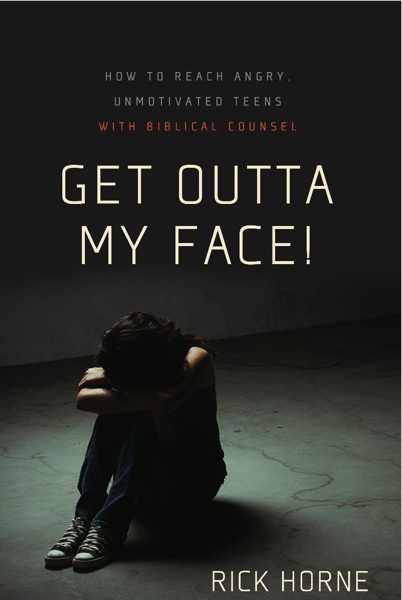
Rick Horne
Reviewed by: John W. Mallin
Get Outta My Face! How to Reach Angry, Unmotivated Teens with Biblical Counsel, by Rick Horne. Published by Shepherd Press, 2009. Paperback, 176 pages, list price $13.95. Reviewed by OP minister and pastoral counselor John W. Mallin.
Get Outta My Face! has helpful insights regarding communication with angry people, including teens. Although it is addressed to those dealing with teens, not only teens get angry. For example, applicable to all is the important point, "But the biblical reality is that we parents have no power in ourselves to change our children. Only God can do that." Horne emphasizes the importance of presentation. He offers useful cautionary notes, such as, "The techniques presented in this book are not a means of manipulating teens. Without genuine respect, however, they can be perceived as manipulation and will likely backfire."
However, Horne recommends appealing to teens' desires, which he takes to be "wise" because God gives wise wants to everyone. So he appeals to the pragmatic orientation of the teenager, hoping that God's way will seem pragmatic to him or her. The "wants" in view are not deep, heart desires, but relatively superficial and fleeting, like good grades in geometry class or the gift of a car. The "wise wants" concept is a potential pitfall of the book. The concept of wanting to be faithful seems to Horne to be alien to the teen, and thus not a motivating desire to which the parent can appeal. Although Horne makes clear that behavior is not all that is in view—heart issues are—the book offers little more than helps for behavior modification.
The question that goes largely unanswered in the book is: how does the gospel address the issues of the angry teen, or, more specifically, how does the anger of the teen miss the gospel? A definition of anger might help to focus thought on the question, such as: anger is a response to the perception that one has been sinned against.
The heart of the problem, upon which Horne touches, is the universe that the teen has created, in which he lives as though he were God, making all the laws. Horne might have shown the reader how to address the gospel to the heart of the angry teen, in place of the tacked-on, general gospel message of faith and repentance in the last chapter. His failure to do so may arise out of his apparent view of his audience: parents and counselors of unregenerate teens, whom he hopes will one day grasp the gospel. The gospel offers even more hope than what Horne expects. For him, the cross serves to make behavioral change last. But the cross promises hope, not only for salvation in the world to come, but for sanctification in the present evil age.
If you want to communicate with an angry teen, this book is helpful. Sadly, it falls short of the goal expressed in the subtitle.
February 01, 2026
January 25, 2026
January 18, 2026
January 11, 2026
Texts that Transform: Church and Ministry
January 04, 2026
December 28, 2025
December 21, 2025
© 2026 The Orthodox Presbyterian Church